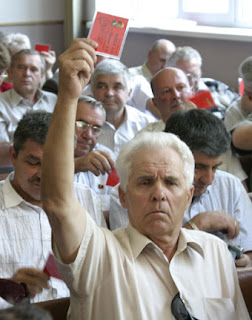Ukraine is mentioned in eight of the 278 embassy cables leaked thus far, and it’s not just in connection with Muammar al-Qadhafi’s “voluptuous” Ukrainian nurse.
(The US Embassy in Kyiv is not (yet?) among the embassies listed as sources for the cables.)
The Holodomor is referenced twice in cables from the past two years.
At the end of October 2008, the US Ambassador to Kyrgyzstan Tatiana Gfoeller attended a lunch briefing in Bishkek with Prince Andrew of the British crown ahead of his royal highness’ meeting with the Kyrgyz government. Many issues were discussed, and the Prince “pounced” when the topic of Russia came up:
"[Prince Andrew] stated the following story related to him recently by Azerbaijan’s President Aliyev. Aliyev had received a letter from President Medvedev telling him that if Azerbaijan supported the designation of the Bolshevik artificial famine in Ukraine as 'genocide' at the United Nations, 'then you can forget about seeing Nagorno-Karabakh ever again.' Prince Andrew added that every single other regional President had told him of receiving similar 'directive' letters from Medvedev except for Bakiyev. He asked the Ambassador if Bakiyev had received something similar as well. The Ambassador answered that she was not aware of any such letter."More recently, Russia’s Foreign Minister Sergey Lavrov raised the Holodomor with Israel’s Foreign Minister Avigdor Lieberman when the two met in Moscow at the beginning of June 2009, according to a US Moscow embassy cable:
"Lavrov raised Russian concern with ‘historical revisionism’ regarding the Soviet Era and Second World War, which, he said, was particularly acute in Eastern Europe but was also present in Israel. He cited Israel's official recognition of the Holodomor, the 1930s famine that occurred in Ukraine. Lieberman explained that by recognizing this tragedy, Israel had not said Russia was guilty of causing it, nor that it was an act of genocide."Lieberman has probably not read Raphael Lemkin’s assessment of the Soviet genocide in Ukraine. Lemkin was a Jewish lawyer who lived in Poland near border with Soviet Ukraine during the years of Holodomor; he was also the man who is credited with coining the term genocide.
Then again, Israel is no longer all that interested in history. At least that’s the message Israel’s President Shimon Peres recently delivered in Ukraine when, during a public lecture on “political and economic challenges in the epoch of globalization,” he said:
“If I was asked what advice to give Ukraine, I’d say: forget history, history isn’t important... you won’t be able to avoid the mistakes of the past, you’ll simply repeat them,” according to the BBC.
Wow is right. Anyway, back to wikileaks and Holodomor: Why would the President of Russia threaten the leaders of former Soviet states with dire consequences if they recognize the Holodomor as genocide? Why would the Russian foreign minister raise the same issue with his Israeli counterpart?
Ukraine never blamed Russia as a state for anything; in fact a Ukrainian court established the guilt of seven organizers of the famine led by Josyf Stalin: two Russians, two Jews, a Georgian, Pole and Ukrainian.
So what exactly irked Russia about former President Yushchenko’s campaign surrounding the Holodomor?
Some would argue that reparations could be demanded from the Russian Federation, as the legal successor state of the USSR, if the international community recognizes genocide (kinda like the Germans paying for the Holocaust).
Others would argue that Russia is not afraid of paying, it’s more afraid of losing face.
Others would argue that Ukraine’s Holodomor narrative – and any historical narrative that’s independent of Russia’s – is unacceptable, because it will undermine Russia’s plans to re-establish hegemony.
Not only does Russia want Ukraine to be part of the Single Economic Space, it also wants all the Soviet republics to be part of the Single Historic Space. (The Single Religious Space and Patriarch Kiril’s Russian world Orthodox Church is part of that plan, too, but that’s another issue altogether).
There can be no room for Ukraine’s unique Holodomor in the common, shared experience of the Soviet Union. Collectivization can only be a common tragedy shared by all the people united by a Great Fatherland (as in Great Patriotic War instead of WWII).
Ask Education Minister Dmytri Tabachnyk: he can give you a copy of the new history text book he's writing for Ukrainian schoolchildren -- it'll all be in there.
Moscow just won’t have it any other way, as the wikileaks have shown. And that makes the Holodomor and other events from the past more than just far off history: it’s about the geopolitics of the very near future.
